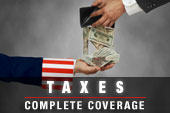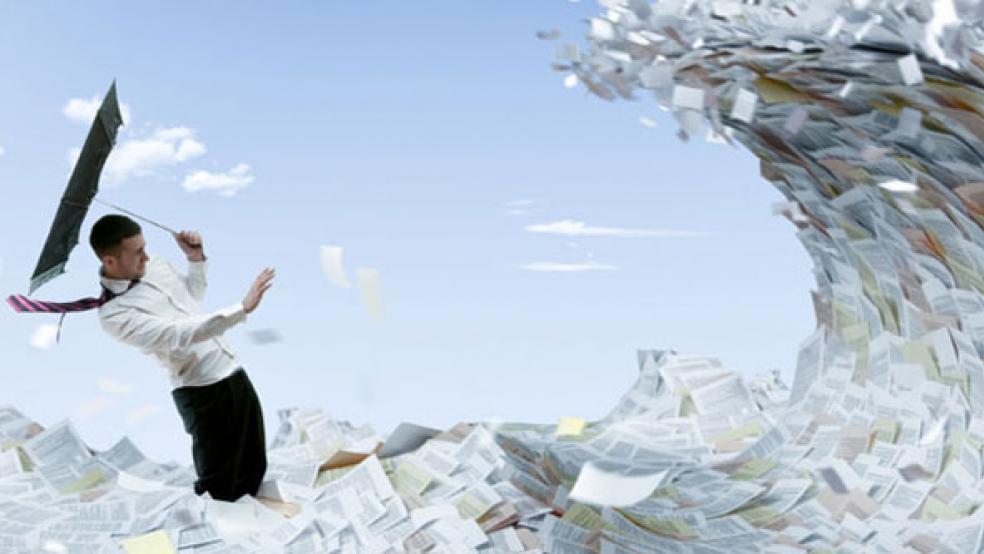Republicans have failed to impress upon voters this simple truth: cutting government spending is less harmful to the economy than raising taxes. That is why the GOP resists President Obama’s incessant plea for tax hikes – not because they are protecting the wealthy, but because they are protecting growth.

This is the Republicans’ best argument for allowing the wide-scale spending cuts called sequestration to proceed, instead of caving into Obama’s demands for higher taxes. Unfortunately, it’s an argument you’ve never heard from our beleaguered legislators. Instead, Americans have been treated to the most sophomoric back and forth on who thought up the mandated cuts (it was Obama), who stands to lose the most politically (the jury is out), who has the cleverest approach to avoiding them (nobody) and who is braver in confronting their political base (hah!)
Republicans need a new playbook, and here it is: the reason that “revenue increases,” as Obama calls them, are worse than spending cuts is that a tax hike sucks money from the private sector, which depresses consumer demand, which lowers profits and stalls hiring and investment. In contrast, cutting government spending means less money is taken out of the private sector – money that could have contributed to higher spending and hiring.
Big government advocates like Paul Krugman will quickly point out that the government creates jobs, and that public employees spend their income just like folks in the private sector. But, studies have shown that the multiplier effect on government outlays is not large – perhaps only about 1.4. That means that every additional dollar of government spending produces only $1.40 of GDP.
Presumably the converse is true; that cuts to spending would only reduce GDP by 1.4 times. Again – by contrast -- a study by David and Christina Romer (the latter a former Chair of Obama’s Council of Economic Advisors) suggests the impact of a tax increase is considerably larger, at 3 to 1. That is, they argue that a tax hike of $1 lowers GDP by $3.
THE TACTIC BEHIND TAXES
Why is the Obama White House so intent on raising taxes? There are two reasons. First, President Obama early on found that deflecting blame for a disappointing recovery was essential to his reelection. Voters were not happy with stubbornly high unemployment; polling showed that creating jobs was the nation’s number one concern.
Obama reasonably began his tenure by blaming his predecessor for the recession. As voters questioned why his efforts and political capital were diverted into legacy-building programs like Obamacare instead of job creation, he searched for a new scapegoat. His apparatchiks hit upon blaming the wealthy – a campaign was born.
By continually seeking higher taxes on high earners, and insinuating that the “one percent” was failing to pay its “fair share” and not playing by the rules, Obama convinced Americans that they were poorer because someone else was richer. President Obama did not worry that he was doing irreparable harm to the achievement ethic that has made the United States so successful. He did not anguish over the message sent to young aspiring entrepreneurs and innovators – that the U.S. might not celebrate success as it has in the past. What mattered was reelection.
The second reason is that President Obama sincerely believes that the government more wisely allocates resources–to pre-school education, investments in green technologies and so on–than the private sector. Consider Obama’s long-running push to eliminate charitable deductions; he thinks that monies flow from federal coffers more intelligently than from private foundations or charities. It stems from his background as a community organizer; it is in his DNA.
Obama will defend his urge to hike taxes by saying that he only wants to hit the wealthy, and that the wealthy will not alter their spending habits because of a modest rise in payments to Uncle Sam. He’s ignoring the fact that with 23 million underemployed and many millions more struggling with underwater mortgages and trying to pay off debts, high earners account today for a larger-than-normal share of spending.
Economists say the top 20 percent of wage earners account today for as much 50 percent of consumer spending. Crimping their style may cause greater damage than in more prosperous times. And there’s no doubt the wealthy are beginning to feel the bite of higher federal and (in some cases) state tax rates.
Pam Danziger tracks affluent Americans’ spending plans. Her most recent survey shows that high-end consumers started 2013 increasingly (and unusually) pessimistic. Fewer than one fourth expect to raise spending on luxury goods over the next year and more expect to be worse off financially over the next year than we’ve seen since the depth of the recession.
Higher payroll taxes and steeper levies on the wealthy, along with climbing gasoline prices, have already unsettled consumers. The last thing we need is another tax increase. President Obama may “win” this round, but it will be the country that is the big loser.






